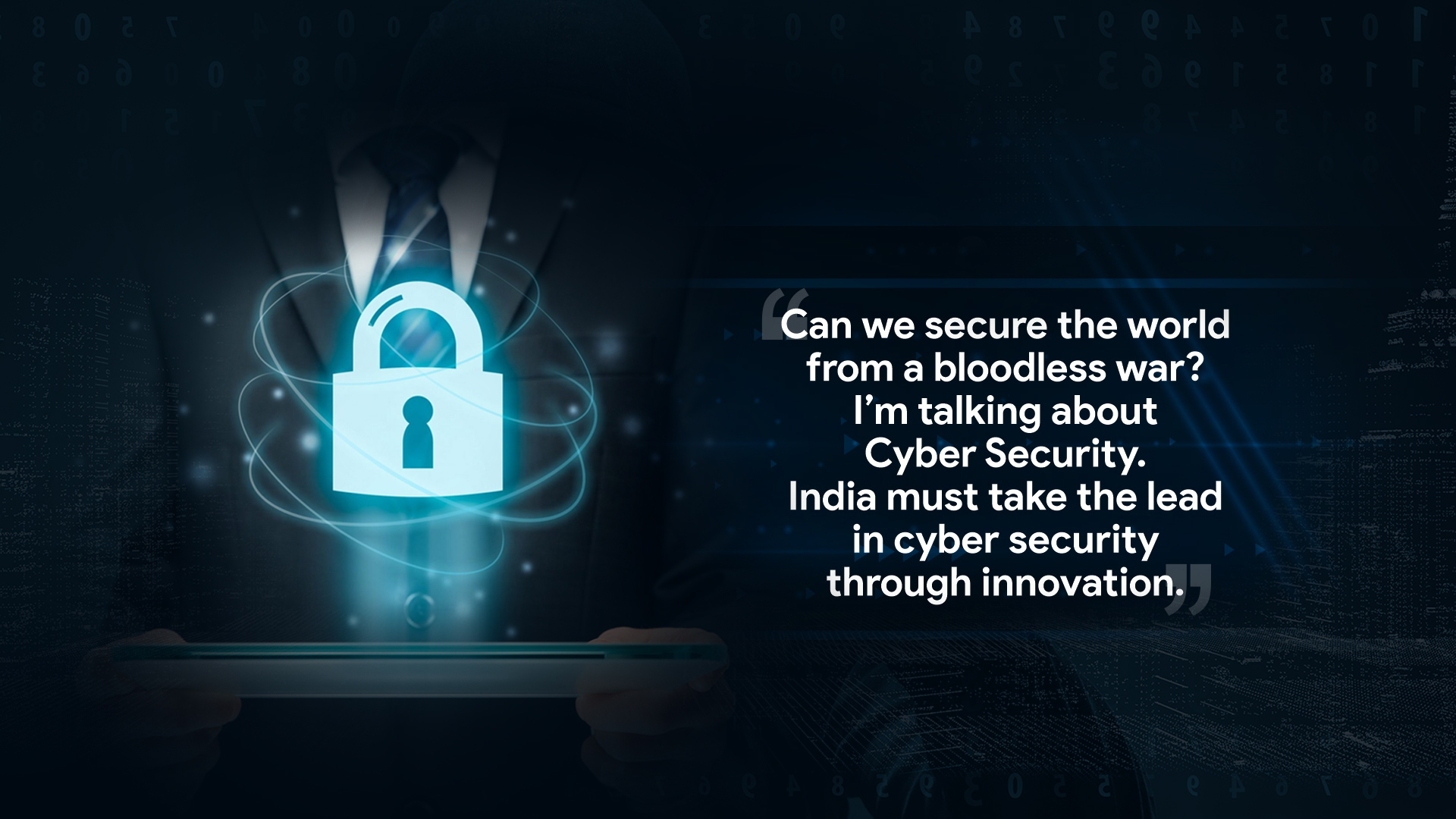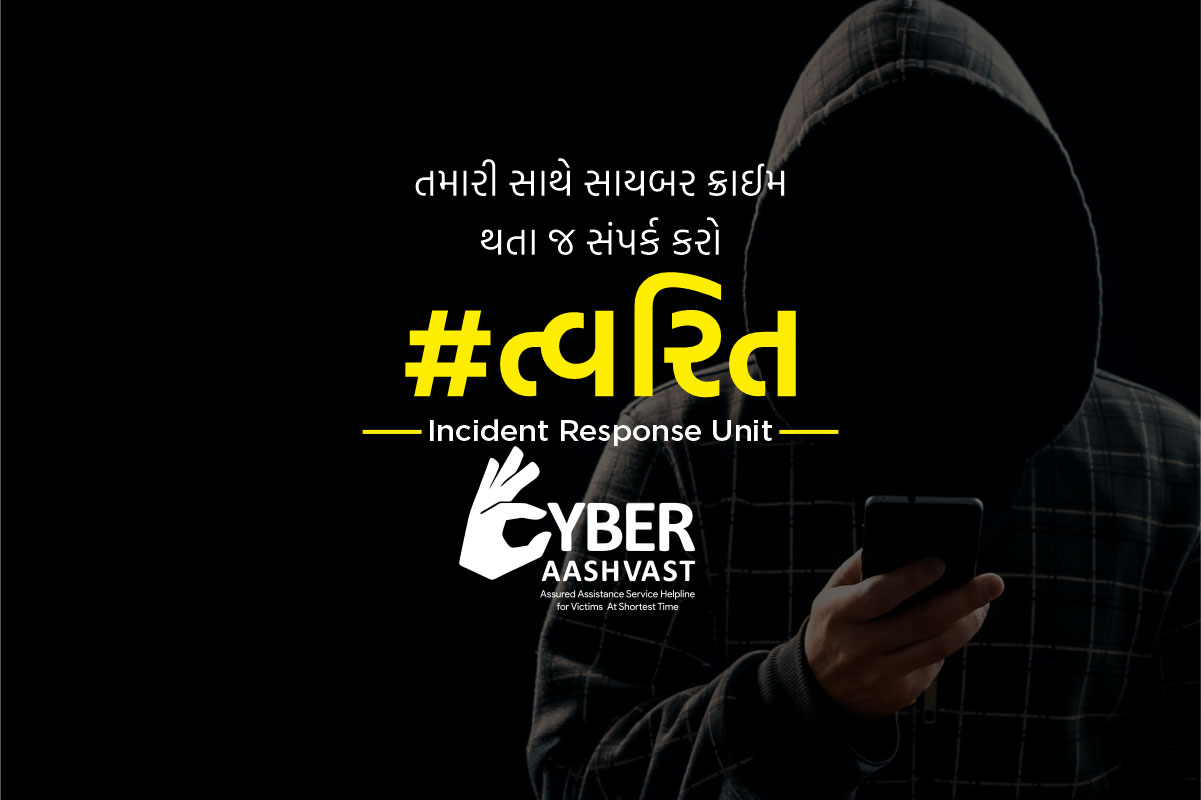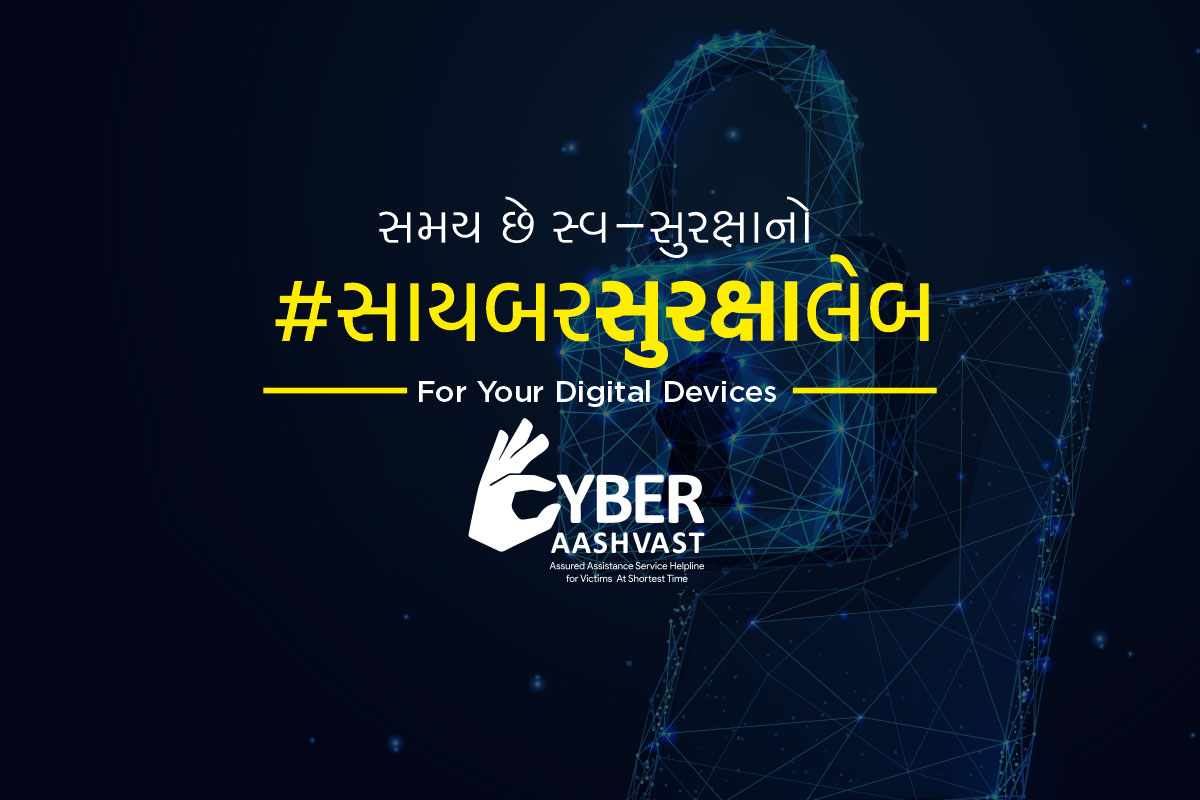About Us
In the era of information technology and internet boom, Gujarat Police is fully equipped to tackle any challenge related to cybercrime safety and security. We are committed to restrict and/or resolve any cybercrime carried out with misuse of digital devices including mobile phones, computers, laptops with or without internet and implementation of provisions of cyber security laws.
Gujarat Police is now extending its support to citizens of Gujarat by setting up of a state-of-the-art control room to monitor and support cyber security across the state. Any citizen can approach the police control room to seek assistance about online frauds, cyber bullying or crimes such as data or identity theft.

Cyber Crime
Cybercrimes are sophisticated crimes carried out with digital means for either monetary or non-monetary gains. In simple parlance, it can be defined as any misconduct using mobile phone, computer, laptop and/ or internet to promote any kind of lure, fraud or causing harassment to other persons online. It includes financial fraud, use of abusive language, theft of password or digital data.
- Social media related fraud
- Online Debit card/Credit card related fraud
- Job Fraud
- Matrimonial Fraud
- Loan Fraud
- Insurance Fraud
- Chemical/Seeds related Cyber Crime
- Online Shopping Fraud
- Tower Installation Fraud
- Lottery / Prize Fraud

The social media user base has increased manifold in past few years as almost all strata of the society using websites such as Facebook, Twitter, YouTube, TikTok and Instagram for business, entertainment, gossip or to pursue their interests and keep abreast of the developments. Several modus operandi are used to defraud the users. Some of them include-
- Creating fake account on social media
- Impersonate someone, upload unauthorized photograph or video of a person
- Hack another person’s profile
- Use of profanity on personal chat or on community pages/ fora
- Nasty language or pornography
- Cyber bullying
- Fake news or spreading rumours
- Hurt someone’s feelings in regard to religion, race, language or region

One of the methodologies constantly on rise, in these frauds a potential victim is approached by phone or SMS and is cautioned/ threatened by a person impersonating a bank official about closure of bank account or increased bank fees if they don’t ‘verify’ their account with relevant details. Sometimes the victims are also lured with promise of good discount or benefit of special offers to get the information such as card number, card verification value (CVV), expiry date and one-time password sent by the bank for verification.
Once the accused get relevant details, they are used to transfer money into another account or for shopping online.
In many cases, the victims don’t get any phone call and still their debit or credit card is misused online. In such a scenario, it is possible that the accused might have gathered the details through online database or use of skimmer machines. These machines look like swipe machines but can read and copy magnetic tape used in a card. With this detail, the accused can also make a clone card.

Thousands of job aspirants upload their details including qualification, communication address and phone number online on various portals and websites. After getting hold of information, the accused make a tailor-made pitch by telephone or email that congratulates the person on matching their criteria and taking the process further.
On pretext of processing fee, caution money or other charges, the victim is encouraged to transfer money to a specific bank account which gets closed after the fraud is over.

Multiple portals and websites have thousands of profiles of youth searching for life partners. A fraudster registers on these websites.
The fraudsters then start contacting persons, projecting themselves as perfect match. Once someone responds, they further the conversation online and then seek help financially. Sometimes they even get married and then decamp with valuables.

Accessing online database, the fraudsters identify potential victims and send emails/ SMS or make calls to them to offer loans at a very competitive interest rate and without registration, tax or GST. The victims get duped when the fraudsters ask for processing fees for the transactions. Once the money is transferred, the phone number and bank account get discontinued.

In this method, the accused retrieve information on customers of various insurance firms and contact them on pretext of getting them refund for insurance or threatening them with discontinuation of the accounts for not accessing it regularly.
Sometimes, the fraudsters even use name of regulatory authorities to scare the insurance policy holder and coax them to pay the amount immediately. Money is also demanded on pretexts such as insurance premium, security deposit, penalty, etc.

In this modus operandi, fraudsters create fake email id or social media profile and approach manufacturers of chemical or seeds. They are almost always based abroad and identify themselves as doctors or subject experts in need of a specific chemical or seed.
Once a person agrees to supply the seeds or chemical, he is asked to submit a deposit or make forward payment for large shipment orders. The callers/ email claim that once the samples are found satisfactory, bigger order would be placed – which never comes through.
Experts believe that India-based Nigerian gangs are active in this fraud where they send across hundreds of emails or read script to lure citizens on phone.

Fraudsters put advertisements for electronic goods, vehicles, clothing, etc. on social media or portals for sale. Once someone contacts them for the same, they are asked to make advance payment for the goods. Once the fraudsters receive money, they don’t deliver the goods at all or deliver wrong/ sub-standard goods. Some websites store credit/ debit card information keyed-in by the customers and misuse it online.
In a variant identified as OLX fraud, the fraudster keeps goods at a very cheap price on the web portal. Once people start spending money on the same, it gets removed from the listing and the fraudsters pocket the money. The goods are not sent, or the ones delivered are found to be defective. The fraudsters also approach officials of payment gateway to get the amount deposited on such sites fraudulently.

The fraudsters lure victims by promising huge returns after they allow installation of a mobile tower on their piece of land. For the same, they ask for caution money or deposit, claiming that many want to install it and thus they would have to choose the right candidate. Once the person agrees to pay, the fake companies seek money in form of registration fee, advance deposit or payment for tower installation. Once the money is received, the calls/ email gets discontinued and the ‘tower company officials’ cannot be traced.
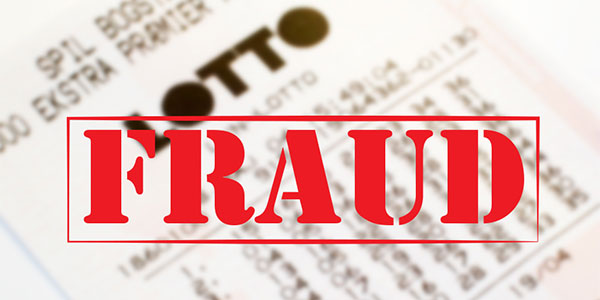
A person can be lured with email/ SMS/ call informing him/her that their name or number was selected in a lucky draw and they can get a huge prize by verifying their details. But for verification, the company would ask for financial details or ask for a payment towards processing fees. Once the person makes the first payment, he/she would be asked for another payment and the cycle goes on till the victim realizes that it’s a trap. It’s considered to be one of the signature Nigerian frauds.
- Email Hacking
- SIM Swapping Fraud
- Customer Care Fraud
- Email Spoofing Fraud
- E-commerce related fraud
- Ransomware Attack
- Data Theft
- Virus/Malware Attack
- Denial of Service

In this crime, a hacker illegally gains access to a laptop/ desktop/ tablet computer. For the purpose, the hacker sends an email or a link in social media/ online platform. Once the unsuspecting victim opens it, with help of specialized software the hackers can steal details such as password of banks, transaction details and email conversations. The method is also used sometimes to harass a person by sending unwanted, disturbing images.
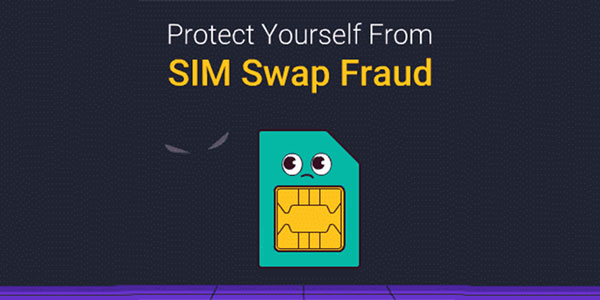
With improved security for online accounts, mobile phone has become a key factor to break into these accounts. If a person experiences fraudulent practice, he/she approaches police but what if the one-time password (OTP) was basis of the transaction? Fraudsters swap SIM or copy information which can be transferred across devices.
With advent of net banking and other online services, possessing mobile numbers is a must with companies sending verification and OTP to customers. The OTP is verified by the fraudster without knowledge of the original owner for financial gains.

Citizens primarily resort to searching online for helpline of various brands. The fraudsters can get contact details right from the company’s open access fora or can spoof a website that looks the same as original to steal data. Likewise, the fraudsters create websites with alternative contact numbers for lodging a complaint. Once a person lodges complaint, he/she is asked to make payment towards various charges. The caller can also assure the citizens that they wanted the bank account details for refund but once the bank and account details are provided, the fraudsters transfer the funds.

Here the accused make exact replica of an email id or use similar-sounding words to spoof the email. Emails are used to share important information quickly and here the fraudsters try to gain by changing delivery method for the goods. They can also change bank account details where the money is to be deposited. As part of the fraud, the accused also try to divert funds or seek money on different pretexts.
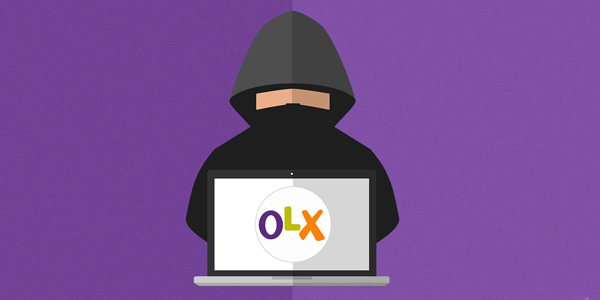
Be cautious while using websites like OLX to buy or sell items. Cheaters create false account here on websites as seller and upload pictures of costly goods and items to be sold at cheaper rates. During conversations, they win confidence of the buyer and ask for advance payment, once payment is done by the buyer, goods / items are never delivered.
On another side, criminals are also looking out for sellers on such websites.
They develop relations with sellers during the deal for buying expensive items from them, ask them to take payment in advance. Send them request from e-wallets like Google pay and misguide them to click on “pay” option instead of “accept payment”. Once the seller clicks on “pay” icon, money are transferred from his / her bank account which never come back.

Ransom is now collected by the criminal’s expert in online programming and hacking by locking down a remote server or individual system. If the system is not protected properly by firewall, these criminals can get access to an individual computer or network of computers and encrypt all data. The method renders computer useless for the person. Hackers do it to demand ransom – payment either through anonymous sources online or Bitcoin to ‘release’ the computer system.

In simple parlance, if any information or data which belongs to a person or organization gets stolen by methods of spoofing, phishing and malware attack, it can be identified as data theft. The data can also be stolen from website, computer, pen drive or email.

Malware can be viruses, trojans, worms or ransomware. The viruses affect system functioning and makes the system slow whereas trojans gather data in the background without getting detected in general scan. The criminals can also steal credentials for identity theft or install a key-logger to identify common keyboard strokes and steal information on debit/ credit card or sensitive data.

In a Denial of Service, the accused attack server of any bank or company and keep it so busy that the server / services turn “unavailable” for normal users. Such situation if continues for a longer time, respective bank or company faces huge financial losses.
Initiatives of Gujarat Police Cyber Crime Cell
Cyber Crime Incident Response Unit (IRU)
Detected a debit/ credit card fraud? Suspecting identity theft? Receiving OTP without process initiated by you? Cyber Crime Incident Response Unit (IRU) will help you immediately for any such incidents. Dial 100 or 112 (for seven newly-formed districts) without hesitation and you would be directed to IRU where the experts would provide you with technical and legal guidance. A timely intervention can prevent monetary loss or can help banks take immediate action. IRU will be a one-stop solution for interacting with various police agencies so that the victims can get help in fastest possible time including filing of an FIR.
Cyber Crime Prevention Unit (CCPU)
Cyber Crime Prevention Unit (CCPU) is a state-of-the-art facility set up by the Gujarat Police to analyse and assess cyber threats and safeguard against it by educating police and citizens about it. In first such attempt, the unit would collect all the numbers and information related to financial fraud carried out using online means and create a database. Analysis of the data would help police agencies understand crime patterns, solve previous crimes and also prevent frauds by timely alert to the potential victim. The unit will also constantly update bank accounts and mobile numbers used by the fraudsters to alert citizens.
Anti Cyber Bullying Unit (ABU)
Harassment or unwarranted intimidating behaviour of persons who are not capable of defending themselves is identified as bullying. When such harassment is done using digital means, it amounts to cyber bullying. Gujarat Police is determined to reach out to cyber bullying victims and put a stop to activities such as nasty messages, online threats, sending unwarranted/ objectionable pictures, intentional isolation or trolling. Contact police helpline 100 or 112 (for newly-formed seven districts of Gujarat) with your issues and our team of experts will provide you proper guidance and help. We will keep your identity confidential and take legal action against the criminals.
Cyber Security Lab (CSL)
As the adage goes, prevention is better than cure. In the world where new viruses and malware are developed daily, one can never be sure of cyber safety without adequate tools. In one of the unique initiatives by Gujarat Police, citizens will be encouraged to assess security of their own digital devices including smart phones, tablets and digital storage drives (hard drive, pen drive, memory card) by use of a specially-designed kiosk. The citizens can carry out the security check for detection of viruses, malware or malicious applications free of cost. Detecting patches and securing your device from any potential attack would be done at our lab.
Messages
Gujarat Police today is one of the most formidable security agencies in India with capability of tackling any challenge. With establishment of dedicated cybercrime prevention and detection units, the state police have added a new chapter in its glorious history of serving citizens of Gujarat. The primary responsibility of a police agency is to maintain public order and uphold provisions of the constitution and legal system of the state and India. The state police have exhibited high standards of professional approach, dedication to the duty and sensitivity towards expectations of state citizens.
Shri Mukesh Puri (I.A.S)
The world has entered in digital era. Modernization and innovation in Gujarat state police are essential to keep up with the technology... View Message
Shri Vikash Sahay (I.P.S)
Seva, Suraksha, Shanti (Service, Security and Peace) is our motto and maintaining law and order is our responsibility - we are Gujarat Police... View Message

